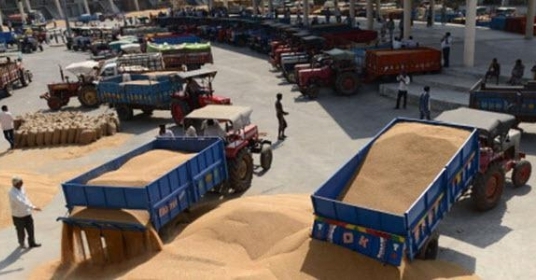Higher wheat & paddy offtake from FCI will boost liquidity of SPAs in FY21: Ind-Ra
July 14, 2020: India Rating and Research in its latest report noted that the higher offtake of wheat and paddy from Food Corporation of India (FCI), for welfare schemes of the central government, will help state procurement agencies (SPAs) to liquidate unsold inventory & debtors and will increase their cash flow from operations (CFO) in FY2021.

July 14, 2020: India Rating and Research in its latest report noted that the higher offtake of wheat and paddy from Food Corporation of India (FCI), for welfare schemes of the central government, will help state procurement agencies (SPAs) to liquidate unsold inventory & debtors and will increase their cash flow from operations (CFO) in FY2021.
History of procurement
SPAs procure the stock of wheat and paddy from mandis and supply them to FCI for building the central pool. In FY2016, the central pool stock grew 7 percent to 36.7 million metric tonnes (MMT) before declining 15 percent in FY2017. Nevertheless, the central pool stock since then has increased at a rapid pace, growing 22 percent in FY2018, again by 22 percent in FY2019 and 23 percent in FY2020 to 56.9 MMT. This is line with the record harvests seen in wheat and rice over FY18-FY20. In FY18, the combined production of wheat and rice was 212.6 MMT, which increased to 220.1 MMT in FY19 and further to 225.1 MMT in FY20.
FCI’s stock of food grains
As a result, the stock of food grains maintained by FCI has generally been way higher than the food grain stocking norms. According to the stocking norms, the country is expected to maintain a certain level of food grain stocks, which is a combination of operational and strategic reserves. As on April 1, 2020, the stock maintained by FCI of rice and wheat were 32.2 MMT and 24.7 MMT as against the stocking norms of 13.6mmt and 7.5mmt, respectively.
"COVID-19 Could Boost State Procurement Agencies’ Liquidity in FY21"
— India Ratings (@IndiaRatings) July 10, 2020
Read more: https://t.co/PjUgSHklUE#IndiaRatings pic.twitter.com/sbSBkCL6vs
Liquidity pressure on SPAs
The substantial increase in the central pool stock has had a negative impact on the liquidity of SPAs. Most SPAs have recorded negative CFO over FY18-FY20 due to a build-up of inventory at their end, as the offtake from FCI slowed down due to its own burgeoning stock. In addition, as SPAs record revenue against unsold inventory in the form of storage charges and associated interest income, the receivable claims from FCI have been mounting, thereby increasing the liquidity pressure. Regular enhancements in working capital limits have accordingly supported the liquidity position of SPAs during these years.
Government welfare schemes & FCI’s storage space
In FY21, Ind-Ra believes that SPA’s CFO position could turn positive, despite the expectation of record harvests in both wheat and rice. In view of the Covid-19 pandemic and the resultant lockdown, the Indian government has announced various welfare schemes to alleviate the stress faced by the poor. Under the PM Garib Kalyan Ann Yojana, free distribution of 5kg of food grains and 1kg of pulses per household for the next three months was announced in March 2020 for the 80 crore beneficiaries covered under the National Food Security Act. This scheme has now been extended up to end-November 2020. Furthermore, the existing limit of 5kg per person per month of food grains at subsidised rates for those covered under the scheme had been hiked to 7kg per person per month.
As all such welfare schemes are being routed through FCI, Ind-Ra opines that the same would free-up the storage space available with FCI, thereby making them ready to accept fresh produce coming in from various SPAs. This would reduce the inventory holding and consequent debtors at SPAs and accordingly facilitate the liquidity through CFO generation.



